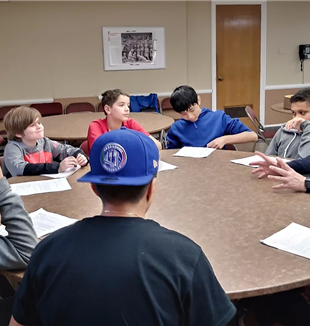
Who Are the "Knights"?
A conversation with Father RobertoWhen Father Roberto Amoruso came to the United States in 2005, he began to work with families in Communion and Liberation in the Washington, D.C., community to organize weekly meetings of 6th, 7th, and 8th grade students, or “Knights,” at local parishes. In this way he was sharing his own experience of meeting the Movement in the mid-1970s as a boy. At that time, a parish priest in Italy who was in the Movement began gathering together 6th and 7th graders every week at the parish for organized games and a moment of sharing. This group grew out of the desire to share the experience of the Movement with kids who were not yet in high school, and thus were too young for GS.
The “Knights” group that Father Roberto has been leading in the U.S. follow a similar format to those first meetings. Every week, 6th, 7th, and 8th graders meet for games, a snack, and some sharing, usually on Friday afternoons.
The name “Knights” is short for “The Knights of St Clement.” It was inspired by a 2007 trip Father Roberto and the students made to Saint Clement's Island in southern Maryland. As he explained, "We were all struck by the faith of the first settlers coming from England that waited on the boat in order to put their first foot on land on March 25th, the feast of the Annunciation, and say Mass as the first act on the new land. The name of this group after that place is in order to honor that faith and share it."
The Knights are offered a simple Rule:
Jesus is proposing something great to you right now.
If you see it, tell us or write it down.
If you don’t see it, say a Memorare in order to see it.
The new school year begins with the Knights renewing their promise from the year before to be faithful to daily prayer and a daily act of charity. After this first moment, the regular sharing in the meeting revolves around the liturgical year. In Advent, the Knights prepare a Christmas play for their parents, and in January, they prepare for and then participate in the March for Life.
According to Father Roberto, this is a moment for the young people to make a judgment about abortion. He reminds them that the problem of abortion “always begins with us.” Thinking about how a child comes from the union of a man and woman becomes a moment for the young people—especially the 8th-graders—to think about how boys and girls look at each other.
Throughout the year, the students learn about the lives of saints. And in Lent, there is preparation for and participation in the Way of the Cross. Lent is also a time to consider the sacraments: What is confession? What is Holy Communion?
At the end of the school year, the students prepare to make the Knights’ promise to be faithful to daily prayer and a daily act of charity. No one is forced to make the promise, but for those who do, Father Roberto said, it is always a “beautiful moment.” A three-day camping trip, a moment for shared experiences like cooking and hiking, wraps up the year.
In every meeting, the Knights discuss the question in the first point of the Rule: What did Jesus propose to you during the week? This question, Father Roberto said, is a moment for the students to begin to realize that “life is not just about me. First there is Jesus always at work for you, and then there are other people too.” Since this is sometimes difficult for students to get this, the leader can guide them with questions like Where is Jesus? Is Jesus in my classroom? Is he present in our house?
Everything is ordered toward helping the kids take the question seriously. In the course of these discussions, the idea of belonging emerges: the kids have to decide whether to be part of the Knights or not. Father Roberto said this is where they discover that they are no longer choosing “what Mom wants, but something for me. This is also a moment for them to start judging: Does this come from You? Does this lead to You?”
Father Roberto says that often the kids have no ready answer to the question What is Jesus proposing? “Sometimes they totally forget, especially the sixth graders, to think about what Jesus is proposing. We give them reminders: did you pray? Jesus is proposing something great. If you see it, write it down. If not, say a Memorare. In this way being 'blind,' not seeing something, becomes prayer, dialogue. Otherwise it becomes about me—did I remember? But life is not about you, about what you can or can’t do: It is about a dialogue. We are introducing them to prayer as dialogue and life as relationship.”